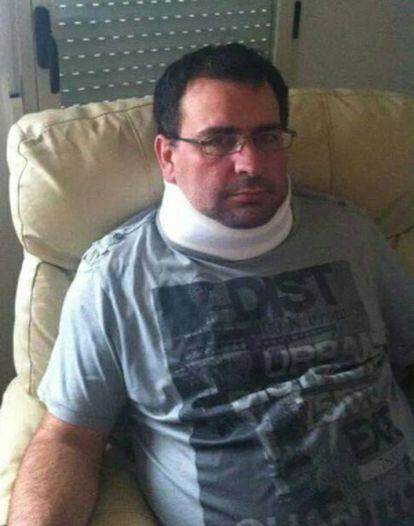Homophobic attacks are on the rise in Spain, but few are complaining
Hate crimes report reveals that only a small percentage of assaults are taken to the police


“We’d just come out of the nightclub. It was 3.50am. Two well-dressed men in white shirts, aged somewhere between 25 and 30, said to us, ‘How are you, boys?’ We said we were going home, and one of them said, ‘You’re not going anywhere, you fag!’ and he started to hit us. It was madness. He kept yelling, ‘Get out of here, you faggots!’ My partner got a broken nose. I’ve got bruises all over my body.”
Miguel and his boyfriend filed a complaint this week at a Madrid court over the attack. While he agreed to talk to EL PAÍS about the assault, he declined to give his surname. He is scared.
“Two other guys who believe they were assaulted by the same person have been in touch with us, but they did not file a complaint,” he explains.
Adolfo Infante and his husband were attacked on October 12, 2013, as they were walking out of a restaurant in downtown Palencia. “Two men punched us and kicked us while they screamed ‘Long live Spain, you faggots!” he explains. “We were so scared that we said we weren’t gay just so they’d stop hitting us, but they didn't stop. The damage from the blows goes away, but there are other kinds of effects that don't heal. We both have needed psychological treatment. What hurts the most is the humiliation, the feeling of powerlessness.”
Adolfo and his husband filed a complaint, and the case remains open. But taking that step was no easy decision.
“Your first reaction is to keep quiet. But it’s the attackers who should be hiding, not the victims,” he adds.
The police tend to play it down and treat it like a fight, even though it’s a hate crime”
Their decision to go public is an exception. Gay rights groups say that assaults are on the rise yet only a fraction get reported to the authorities. In 2010, the European Commission asked the European Agency for Fundamental Rights to collect data on discrimination and crime against gays, lesbians and transsexuals.
The survey, released in May 2013, showed that 46 percent of Spanish respondents claimed to have been the victims of attacks or violent threats over the past year, one percentage point above the EU average. Yet only 18 percent had filed formal complaints, one point below average.
Asked why, Spanish respondents said it did not occur to them (48 percent), or else they thought it would be useless (32 percent); out of fear of a homophobic reaction by the police (19 percent); for fear of reprisals (16 percent); and out of shame (15 percent).
“We are seeing a similar effect as with abused women years ago,” explains Raúl García, of the Madrid-based LGBT group Cogam. “We recommend that they file a complaint, but we cannot force them to.”
The younger the victims, the greater the likelihood that they have not told their friends and family about their sexual preferences. Amanda Rodríguez, coordinator of Arcópoli, an LGTB association for the Polytechnic and Complutense universities in Madrid, said that most assault victims they see “have not come out of the closet yet.”
The FELGTB national federation has launched a campaign under the slogan “No te calles, ¡denuncia!” (or, Don’t stay quiet, report it!) urging victims and witnesses to report cases.
We need a specific law, just like the one that fights abuse against women”
Adolfo Infante, attack victim
Both Miguel and Adolfo also have bad things to say about the way the police treated them when they went in to file their complaints.
“They were unpleasant,” says Miguel. “That is why we decided to report it directly in the courts.”
“They tend to play it down and treat it like a fight, even though it’s a hate crime,” says Adolfo. “And if the police statement is poorly drafted, there is very little chance of a complaint getting anywhere. It is essential for police officers to receive specific training and to create a protocol for these cases, just like they did with abused women.”
In April, following EU recommendations, the government for the first time published a report on hate crimes, which are not described as such in the Penal Code but considered an aggravating circumstance instead. This study showed that out of the 1,172 hate crimes recorded in 2013, a majority (452) were based on the victim’s sexual orientation, followed by race (381) and disabilities (290).
The Interior Ministry claims that more than 14,500 police and Civil Guard officers have already undergone specific training to deal with hate crimes. But Miguel and Adolfo have yet to notice this change in attitude.
The Madrid Attorney’s Office released a report this month that mentions a rise in these kinds of attacks and confirms Miguel and Adolfo’s feeling: “Daily practice shows that many of these matters may sometimes be considered of minor importance by law enforcement agencies, judges and attorneys.”
The latest report by the Attorney General also warns about the fact that these crimes are often “not properly classified” due to the way that the police or court conducts the investigation and to the fact that many victims fail to report attacks “due to personal circumstances, fear of reprisals, a feeling of vulnerability, lack of trust in law enforcement agencies or a lack of legal residency papers.”
Almost a year after his own brutal assault, Adolfo knows exactly what he would like to see happen: “We need a specific law, just like the one that fights abuse against women.”










































